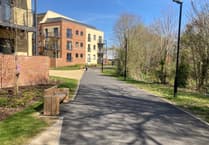More than two million people across the UK have already received their first Covid vaccine dose.
This includes about 40 per cent of people over the age of 80, and that total so far is more vaccinations than anywhere else in Europe.
It is a huge task being undertaken and until very recently there has been the additional challenge of the constraints of the Pfizer vaccine. It has to be stored at minus-70 degrees and therefore isn’t suitable for some types of distribution.
We now have as well, though, the Astra-Zeneca/University of Oxford vaccine, which is much more flexible.
There is also now a third vaccine licensed, from Moderna, that can be stored at minus-20 degrees for up to six months.
Hampshire NHS was quick off the mark, and is ahead of national rates on proportions of people vaccinated.
This has included healthcare professionals being vaccinated from the start at Portsmouth.
There is also a large-volume facility at Chineham for the catchment area of Basingstoke hospital, including the Alton area.
And to date there are 36 local vaccine service locations across Hampshire, in addition to the main hospital hubs, with more to follow in the next few weeks.
This includes the Forest Surgery in Bordon and the Festival Hall in Petersfield.
The roll-out of the vaccination programme continues apace nationally this week, with more than 1,200 smaller sites up and running. These are as well as 223 hospital sites, seven large-scale vaccination centres, and the first wave of 200 community pharmacies is also now in action.
The vaccination programme is the largest in the history of the NHS and the country. It is the result of months of preparation by the vaccine taskforce, the NHS, the armed forces, and local government at every level.
The scale and logistics of the programme are vast with 80,000 health professionals being mobilised to help with the roll-out.
And more than 200,000 members of the public have also put themselves forward to help, and I want to thank and commend all the local people who have volunteered.
A vaccine was always going to be the best way out of this pandemic, but it will inevitably take time to deliver the full programme.
But the plan is for there to be capacity to deliver around two million vaccinations in England per week by the end of January.
Residents and staff in more than 10,000 care homes across the country are also set to be offered a vaccine by the end of the month.
The target is to see 15 million people vaccinated by the middle of February – the top four most vulnerable groups, as identified by the Joint Committee on Vaccination and Immunisation (JCVI).
These are people aged 70 and over, care-home residents, the clinically extremely vulnerable, and the health and social care staff looking after them.
These are the people most at risk of developing a serious illness and needing care in hospital.
With very serious warnings this week that the NHS is facing its toughest time yet, we must of course do everything we can to reduce the burden on the NHS – especially on the hospitals and staff looking after the tens of thousands of patients with Covid already in their care.
But there are many other people who will need protecting. We know how important it remains to keep schools open for those most in need.
And, of course, access to face-to-face teaching remains key for all pupils and students; reopening schools remains a top priority.
In my speech in parliament last week I called for teachers and other key workers to be treated as high priority for vaccination, once the highest risk groups are covered.
The initial roll-out will continue to prioritise the first doses of vaccine for as many people as possible.
The UK chief medical officers have agreed the longer-interval time frame so more people can get their first dose quickly – and because the evidence shows one dose offers a high level of protection.
The more people covered in this way, the better for community protection.
But everyone will still need to receive a second dose.
It is vital that anyone who has had the first dose continues to follow the rules on social distancing, allowing time for immunity to build.
And it also not yet clear if the vaccine prevents people contracting the virus and transmitting it to others.
An increase of asymptomatic testing will help find more cases and support critical sectors and workplaces where people cannot work from home.
With roughly a third of people who have coronavirus showing no symptoms, testing is vital to help break transmission chains across our communities.
And the expansion of community testing is also a vital part of the fight against the spread of the virus
People will, of course, be eager to get protected, and delivering this vaccination programme could not be more important in our fight against the virus – and to help see more of normal life return for all.





Comments
This article has no comments yet. Be the first to leave a comment.